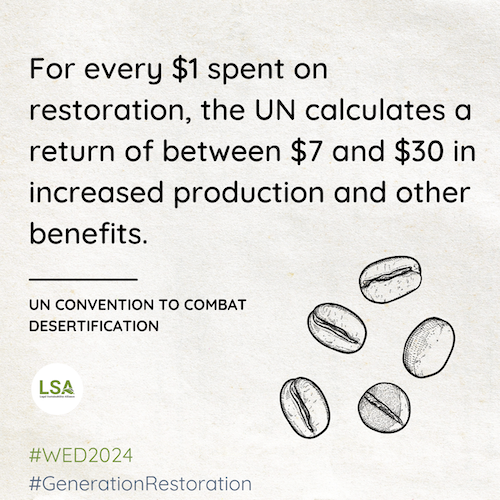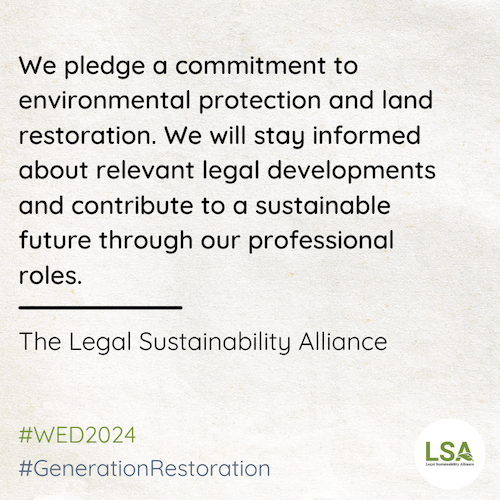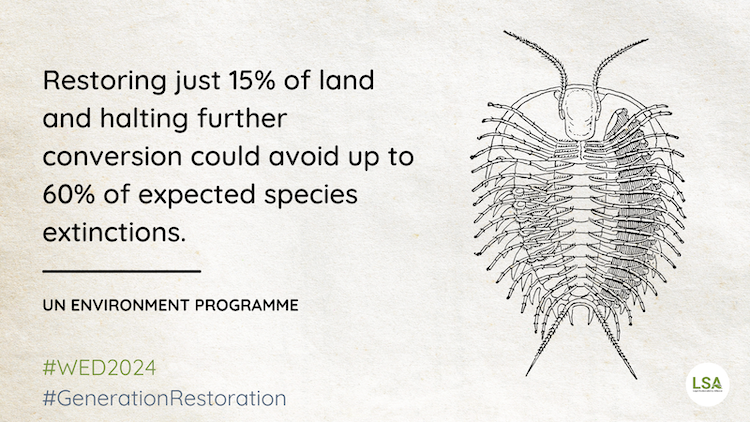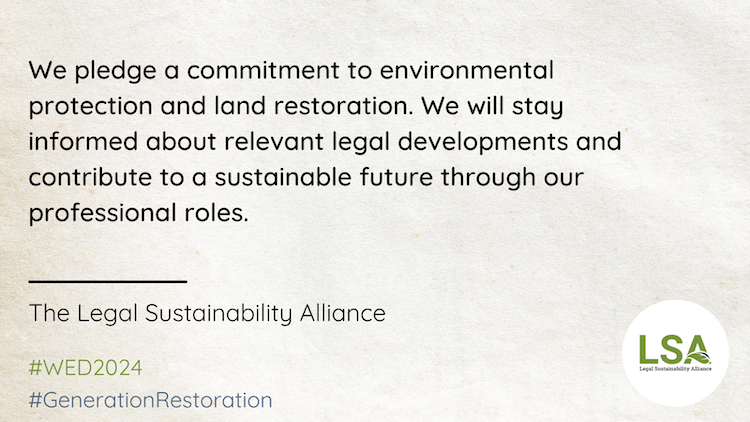
by Beth Salt | Feb 5, 2025 | LSA Insights

The Launch of the LSA’s Nature and Biodiversity Working Group (by Jenni Ramos)
The Legal Sustainability Alliance has hosted several workshops on biodiversity and nature in recent years, with a particular focus on what it means for lawyers. Our 2024 summer event “A legal lifeline for nature” featured Clare Brook (CEO of Blue Marine) in discussion with Sharif Shivji KC (co-author of the legal opinion Nature-related risks and directors’ duties under the law of England and Wales).
Many assume that the intersection between law and nature is found primarily in litigation cases such as those pursued by Blue Marine Foundation, environmental law practice or planning law and biodiversity net gain regulations.
While these are important areas, the relevance of nature and biodiversity to many members of the LSA falls outside the sphere of environmental and planning law and emerges from the ‘business case for biodiversity’. The legal opinion described above found that nature-related risks and opportunities are highly relevant to the duties of company directors to act with care and promote the success of their company. This is due to the global recognition that biodiversity loss and ecosystem degradation pose financial risks to the entire economy and the companies and financial institutions within it. This places it firmly on the agenda of lawyers who advise companies across all practice areas. It is an emerging area of law that most lawyers are either unaware of, or only just beginning to grapple with.
Nature-related risks include physical and transition (including legal) risks. They can manifest in procurement and supply chain issues, strategic nature-related litigation (including cases relating to anti-money laundering, greenwashing and financial misrepresentation), insurance risk assessment and compliance with corporate and financial sustainability reporting and due diligence frameworks.
Nature-related risk is often viewed as a future concern or merely a compliance issue with incoming reporting regimes. Whilst the World Economic Forum’s Global Risks Report has in recent years consistently listed biodiversity as a top five risk over the next ten years, this framing of it being a future not immediate risk is misleading. The UK legal opinion (written by leading barristers primarily specialising in corporate and financial law) emphasised that a company’s nature-related dependencies or impacts had the potential to affect a company’s short term interests as well as its long term financial success. Nature related risks can be both acute and chronic in character and have the ability to manifest in cascading and compounding chains of events which could manifest rapidly in the short term.
The LSA is launching a Nature and Biodiversity Working Group to discuss how nature-related risks and their associated reporting regimes will affect member firms and clients. Members can explore issues they are facing, discuss where nature-related risks sit on their firm’s agenda and how it integrates with existing work on climate risk, sustainability reporting and supply chain due diligence. Members will lead the group’s direction, fostering knowledge sharing, identifying practical insights and potential outcomes.
As chair of the working group, I will be facilitating the first session, provisionally on 25th February at 12.30pm. Please email manager@legalsustainabilityalliance.com if you would like to join us.

by Beth Salt | Jan 6, 2025 | LSA Insights
This LSA lunchtime event for exec firms was a great success, with nearly 50 LSA members enjoying the in-person session on transition planning. Huge thanks to our speakers for their valuable and interesting contribution. Thanks also to Caroline May of Norton Rose Fulbright for chairing the discussion and to Sarah Hickey and Paul Davies at Latham & Watkins for generously hosting the event. We asked our speakers for their key takeaways, listed below.

Speakers:
Thomas Hale and Emma Lecavalier, Blavatnik School of Government at the University of Oxford
Ashleigh Lee, City of London, UK Transition Finance Market Review
Ira Poensgen, LSE GRI, International Transition Plan Network
Takeaways:
Ira Poensgen, LSE GRI, International Transition Plan Network
– The Transition Plan Taskforce was set up in March 2022 with a mandate from the UK Government to bring together leaders from industry, academia, and regulators to develop good practice for transition plan disclosures.
– Key deliverables from the TPT include its Disclosure Framework, sector-specific guidance, a paper on legal considerations for transition plans, as well as technical mappings to various other standards and frameworks.
– As of June 2024, the IFRS Foundation has assumed responsibility for the TPT’s disclosure-specific materials. This transition represents a significant milestone in global efforts to harmonise transition plan disclosures.
– The TPT wrapped up in October 2024. In its final report, TPT recommended four areas for future efforts:
- Building market capabilities, practice and sharing experiences
- Developing enabling tools and driving thought leadership
- Ensuring that transition plans are integrated into decision-making: a) C-Suites and boards: Using transition plans as a change management tool. b) Investors and lenders: Enabling risk assessment, risk pricing, and informed capital allocation. c) Policymakers and regulatory authorities: Understanding transition trajectories and informing decision-making
- Increasing global consistency in transition planning norms and expectations.
– The team behind the TPT Secretariat has launched the new International Transition Plan Network to support the development of global norms for transition plans and planning.
Emma Lecavalier, Blavatnik School of Government at the University of Oxford
– Transition planning regulation is diverse: some regulation and policy targets corporate actors, but other rules use transition planning to coordinate across government or to shift sectoral performance (i.e. in energy, transportation, finance, agriculture).
– Transition planning is a valuable tool as governments look to organize economy-wide net zero transition. However, we need to be aware of risks that multiple rules can create friction or redundancy.
– Across all types of transition planning—corporate, national, and sectoral—we should be mindful of good practices such as: pairing disclosure with transition planning to enhance transparency and accountability; using third party verification and assurance to improve the data underpinning transition plans; and mainstreaming transition planning into spending (i.e. public and private procurement).
Ashleigh Lee, City of London, UK Transition Finance Market Review
– Companies and governments will require credible transition finance to deliver on decarbonisation commitments and meet Paris Agreement goals.
– The UK is uniquely positioned to become a leading hub for the transition finance market and use its leadership position for financial and professional services to accelerate the global transition. McKinsey & Company estimate that enabling the net-zero transition could bring in £1 trillion to UK businesses by 2030.
– The UK’s Transition Finance Market Review (TFMR) provides a framework to scale the market for transition finance in the UK and globally. Central to the findings of the Review are recommendations on how to unlock the required levels of finance by creating the right policies, pathways and signals for investment through collaboration between government, investors, business and civil society.
– Key recommendations of the Review include:
a) National sectoral transition planning and policy certainty: Scaling transition finance will require a greater level of granularity in sectoral transition pathways, greater collaboration with industry, and a greater level of coordination across government. The Review recommends a commitment to resourcing the Net Zero Council to deliver this granularity.
b) Catalytic capital and activity-level de-risking: Reaching commercial maturity for emerging transition activities will require effective policy, catalytic public capital, and public-private innovation. The Review recommends establishing a Transition Finance Lab to develop and test targeted financial solutions to tackle these challenges.
c) Transition planning and the supporting ecosystem: To move towards general-purpose transition finance predicated on a credible transition plan, the Review recommends mandatory Transition Plan Taskforce-aligned transition plan development and disclosure, and an evolution in the supporting data, assessment, verification, and assurance of transition plans.
d) Embedding credibility and integrity: The Review adopts a Transition Finance Classification System and proposes Guidelines for Credible Transition Finance. A principles-based approach to transition finance aids coalescence around core elements whilst enabling sufficient flexibility in other markets including emerging markets and for SMEs.
e) Delivering a roadmap for transition finance: Establish a Transition Finance Council to ensure delivery of the Review’s recommendations, as well as supporting capacity building, collaboration, and coordination.
For more information on any of the topics listed above, or to find out more please email the LSA manager Camilla on manager@legalsustainabilityalliance.com.

by Beth Salt | Jan 6, 2025 | LSA Insights
From collaborations to climate litigation, biodiversity to climate conscious pro bono – we asked our sustainability consultant colleagues to predict what trends might affect law firms committed to sustainability in 2025.
Sustainability trends affecting the sector:
- Sustainability Disclosure Standards (SDS): UK Sustainability Disclosure Standards are expected to impact businesses and potentially law firms themselves. Law firms will need to stay ahead of these to support clients and comply internally
- ESG reporting obligations: With enhanced ESG regulations, firms will need to guide clients on compliance with stricter supply chain rules, emissions disclosures and due diligence frameworks
- Advised Emissions: An emerging issue for law firms, linked to the growing risk of activist pressure on firms for their role in enabling high-carbon projects
- Increased spotlight on Carbon Markets: Voluntary carbon markets are here to stay, but expect greater transparency and a push to increase buyer confidence and market credibility
What might matter to your clients in 2025?
- Net-Zero mandates: UK law firms may develop a pathway and align with both client and the legal sector commitments to net-zero emissions, including operational carbon neutrality
- Sustainability regulations and compliance: Supporting clients as they comply with regulatory requirements including ISO, ESOS, SECR, TCFD and CSRD. Check out the LSA’s podcasts on these frameworks
- Biodiversity protection: Supporting businesses in compliance with biodiversity and ecosystem preservation regulations
- Climate adaptation policies: Advising clients on mitigating physical climate risks and risks to human health (e.g., extreme weather, resource scarcity, flood risk)
- Green finance: Advising clients on structuring green bonds, sustainability-linked loans and navigating ESG-related financing requirements
- Climate litigation: The rise of climate-related litigation opens new practice areas, both in prosecuting and defending cases tied to environmental impacts
- Rise in Greenwashing litigation: Lawyers will need to counsel clients on transparent ESG communications to mitigate the risk of such lawsuits
Sustainable operations within firms:
- Reducing carbon footprints: Matching client expectations that law firms are implementing sustainable practices within their own offices, such as energy-efficient and paperless workflows
- Sustainable procurement: Procurement that scrutinises the social, ethical and environmental products and services to achieve an overall level of best value
- Sustainable supply chains: Enlisting eco-friendly vendors and services for operations to support reducing scope 3 emissions in line net zero targets
- Pro bono climate action: Exploring opportunities to provide legal support for NGOs or climate initiatives working towards mitigating the climate crisis and ensuring climate justice
- SDGs: Embedding sustainable development goals with polices to support change
- Circular economy: Whereby the design and use of products are carefully planned to be adaptable for reused and repair
How law firms can position themselves as thought leaders in 2025?
- Walk the Walk: Strive for even more robust, transparent and comprehensive carbon reporting (especially scope 3) to avoid claims of greenwashing and demonstrate commitment to a transparency
- Green guide listings: Recognition in publications like The Legal 500 Green Guide for sustainability efforts could attract clients committed to ESG values
- Client collaboration: Partnering with like-minded clients on sustainability initiatives to build long-term, value-aligned relationships
- Hosting events and panels: Organising forums on sustainability topics to reinforce expertise and engage with the business community
- Communicating your sustainability successes: Use groups (like the LSA!) to amplify and share your sustainability stories on social media and in other comms. The LSA shares sustainability news via our website, our socials and our regular bulletin
How to communicate to colleagues why these trends are important?
- Attracting talent: ESG matters when recruiting. Offering meaningful sustainability policies will attract employees who value corporate responsibility
- Employee initiatives: Encouraging staff participation in green programs, like volunteering for climate action groups or leading internal sustainability initiatives, can improve wellbeing and support retention, as will robust and transparent policies designed to mitigate climate change

by Beth Salt | Dec 9, 2024 | LSA Insights
An interview with Maria Nefeli Bernitsa, Partner at Bernitsas Law, about lawyering on the front lines of a climate crisis and climate-conscious lawyering.
Clara Douglas: How does being a Greece-based firm influence your choice to pursue sustainability?
Maria Nefeli: Greece comes face to face with the consequences of climate change every year. Several times this summer, people had to evacuate their loved ones or pets and check on their properties because a wildfire was approaching their homes. There were days when the sky around the office would be black and orange from particulates from the fires. Flash floods are also becoming a common phenomenon. So, I think that sustainability is more than an academic discussion for us and prioritising environmental considerations and actions is a necessity.

Athens at sunset
Clara: Why did you decide to join the LSA?
Maria Nefeli: The LSA is an organisation whose values align with many internal conversations we have had for many years. Managing our business responsibly is the foundation on which the firm has achieved sustainable growth over the years. Commercial success for our firm has always been contingent on the personal success of our clients, our people and the broader community. Therefore, our firm’s ethos naturally mapped onto emerging discussions about ESG. Membership of the LSA allows us to benchmark our ESG performance and initiatives with the international legal industry standards and to join a community of firms committed to being part of the solution.
Clara: What has Bernitsas Law been doing so far to become more sustainable?
Maria Nefeli: Like many firms, we first looked inward and identified the key environmental impacts of our business. We are continuously working towards minimising our environmental footprint. Initiatives have included making our building more environmentally sustainable, upgrading our waste management system and raising awareness. We have been running training programs on how to recycle effectively, with great results and immediate results in our recycling outcomes, as well as on first aid and CPR. Gathering information for our Sustainability Report has been very rewarding as it presents a consolidated view of everything we have been doing, from responsible business and governance practices, initiatives taken for our community made up of our people, the society in which we work and our clients, and of course our environmental commitments.
Clara: Has your sustainability journey impacted your client intake and work?
Maria Nefeli: As far as we know, we are the first firm in Greece to have a dedicated ESG department and lawyers across several departments advise on ESG issues in their areas of expertise. This means that throughout the firm, ESG principles are adopted and considered early on in new projects and consistently throughout. While it is difficult to measure whether client intake has grown as a result of our approach to sustainability alone, it is certainly true that clients are interested both in what we do as an organisation, but also how we can help them reach their ESG goals.
Clara: What are the main challenges you have faced on your sustainability journey, and how did you overcome them?
Maria Nefeli: One challenge we had is that we are based in a historic building in the center of Athens and making structural changes which would lead to it being more energy efficient is difficult due to strict building codes. We have made and continue to make significant investments in adaptations to improve the environmental performance of the building, including installing energy efficient lighting, air conditioning and windows. Our location is an advantage as we are in walking distance of many of our clients and very short trips to the courts and central government offices, which impacts our travel emissions positively. We also implement an almost complete power down every night and over the weekends, which benefits our neighborhood and is a significant win in terms of energy consumption. Rather than relocating to a new building, we are committed to being part of the effort to make historic buildings more sustainable and feel that in this way, we are working within our community to help improve energy efficiency on a city-wide level.
Clara: With many law firms opting to relocate their premises to be more energy efficient, I have yet to consider whether this does not necessarily reduce emissions on a systemic level. It is great to see how a firm approaches this challenge in a way that could benefit the city.
Maria Nefeli: Well, a key part of our approach and what is required for a just and fair transition is that people and businesses are “good neighbours”, so it feels right to consider community-wide changes.
Clara: How do clients feel about the firm taking a more sustainable approach?
Maria Nefeli: Many of our clients seek our advice in making their disclosures and we have a demonstrated expertise in structuring compliance models. I think that advising our clients on how best to achieve their sustainability goals must go hand in hand with a clear message on what our sustainability goals are and what we do to achieve them.
Clara: What do you wish lawyers knew about climate change?
Maria Nefeli: I think we are now at a stage where lawyers are aware of the importance of climate change and that environmental action is part of the agenda of the majority of law firms. Achieving sustainability goals is always a work in progress and I am not sure that I can provide any insight, other than to say that collective action and awareness through an organisation like the LSA is probably more impactful in the long run. Being part of the solution means playing the long-game and creating the structure for durable and resilient outcomes.
Clara: What do you wish lawyers would do?
Maria Nefeli: Again, I think that the legal profession in general has made huge strides in the right direction over the last years. Lawyers are in a position to really assist their clients in achieving their sustainability goals and to advise effectively on the fantastic and financially viable opportunities for transactions and projects in the green space.
Sustainability can be complex and challenging for lawyers and their clients, but I think we can contribute in a meaningful way to the goals which have been set for 2030 and beyond by approaching the advice we give our clients and the management of our own firms with integrity. The first wave of ESG regulation took the form of disclosures, but this mustn’t be where sustainability stops. Disclosures help make people accountable and force them to take action but are the first step to identifying the issue before setting goals to really address the problem.
Clara: What is next for Bernitsas?
Maria Nefeli: We have a number of exciting environmental initiatives coming up this year and are committed to enhancing our performance and ensuring that we measure our progress in a meaningful way.
——
 Maria Nefeli specialises in financial services and ESG law, with a focus on high impact legislative changes, capital markets transactions and corporate transactions for listed companies. Find out more about Bernitsas Law here. Maria Nefeli heads up the Firm’s Environmental, Social & Governance (ESG) department, and advises extensively on ESG legislation with a focus on the laws affecting firms in the financial services sector.
Maria Nefeli specialises in financial services and ESG law, with a focus on high impact legislative changes, capital markets transactions and corporate transactions for listed companies. Find out more about Bernitsas Law here. Maria Nefeli heads up the Firm’s Environmental, Social & Governance (ESG) department, and advises extensively on ESG legislation with a focus on the laws affecting firms in the financial services sector.

by Beth Salt | Nov 13, 2024 | LSA Insights
COP 29 – what will ensure genuine commitment, specific action and measured progress?
By Kirsty Rogers, Chief Sustainability Officer, DWF
Expectations are set for COP29 and behind the detail surrounding the desired outcomes, what the negotiations are ultimately aiming to achieve is international progress on the legally binding commitments made by signatories to the 2015 Paris Agreement. This is to ensure alignment of global efforts to urgently limit global warming and significantly reduce carbon emissions by 2050 at the latest.

It is clear that unprecedented levels of collaboration are required in order to address urgent climate challenges. The key areas for collective action include accelerating net zero targets, strengthening resilience, mobilising equitable finance, putting nature into the centre of Climate Action, and advancing innovation for Resilience. There is also an increasing focus on the role of local actors, grassroot leaders, indigenous peoples and youth. The need to empower and work alongside these communities has never been so important.
These collaborative efforts are essential to drive meaningful progress.
Parallels can be drawn between the difficulties of negotiating through the COP process with the complexities for businesses as they develop and set out their own plans to deliver net zero targets. The common factors here include uncertainty, uncharted territory, complexity and the need to work together to find solutions to achieve positive outcomes.
DWF recognises the importance of collaboration in its own journey and is part of sector and industry-led collaborations and partnerships – in particular Legal Charter 1.5, Legal Sustainability Alliance and Net Zero Lawyers Alliance. Through these, we are grappling with a range of challenges and opportunities and importantly sharing our experiences, expertise and individual perspectives in a safe and supportive environment. This has enabled us to move forward.
Our investment in education, combined with existing legal expertise and working collectively means we can provide expertise and knowledge across a range of challenging subject areas both for ourselves and with our clients. These include:
- The development of educational resources to support behaviour change and improve understanding about climate change and how it impacts the legal sector
- Developing processes to help us to understand the impact of the work that we do and to put in place better practices for due diligence so that we can make more informed decisions and manage risk
- Supporting technical projects to set out mechanisms and a framework for understanding and quantifying the carbon impacts of the work that we do with our clients
- Advising clients on their regulatory requirements, assisting in explaining their compliance obligations and providing both legal and consultancy advice across the spectrum of sustainability
Despite the challenges that the world is facing I am constantly inspired by the commitment, dedication and drive of the businesses and individuals that provide their time and expertise in the spirit of collaboration, at COP29, within the business, legal and local communities and at DWF. There is still so much more to be done and many issues for us to consider, not least the urgent need to incorporate biodiversity and nature targets into our transition plans; a clear message coming from the ‘sister’ COP16 on biodiversity which concluded last week.
Through COP29, the world needs to continue to strive for collaboration so that we achieve international consensus and action on climate change. There is a role for us all to play in our own sectors to step up to the plate and provide leadership through collaboration and partnerships. This is crucial so that we can collectively solve challenges and exploit the opportunities that can be achieved as we transition our businesses to become net zero and nature positive.

by tess | Jul 26, 2024 | LSA Insights
World Environment Day graphics for LinkedIn and X/Twitter available to download here, including the LSA pledge. Download images are high res, please feel free to co-brand and resize as appropriate. Additionally find our blog detailing green hacks to make a dent in your carbon impact – “Green Hacks with a Big Impact” here.
LinkedIN Graphics






 Maria Nefeli specialises in financial services and ESG law, with a focus on high impact legislative changes, capital markets transactions and corporate transactions for listed companies. Find out more about Bernitsas Law
Maria Nefeli specialises in financial services and ESG law, with a focus on high impact legislative changes, capital markets transactions and corporate transactions for listed companies. Find out more about Bernitsas Law 











